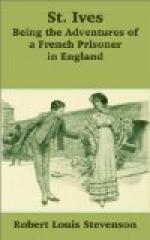This left the Major and myself alone at the table. You must not suppose our tete-a-tete was long, but it was a lively period while it lasted. He drank like a fish or an Englishman; shouted, beat the table, roared out songs, quarrelled, made it up again, and at last tried to throw the dinner-plates through the window, a feat of which he was at that time quite incapable. For a party of fugitives, condemned to the most rigorous discretion, there was never seen so noisy a carnival; and through it all the Colonel continued to sleep like a child. Seeing the Major so well advanced, and no retreat possible, I made a fair wind of a foul one, keeping his glass full, pushing him with toasts; and sooner than I could have dared to hope, he became drowsy and incoherent. With the wrong-headedness of all such sots, he would not be persuaded to lie down upon one of the mattresses until I had stretched myself upon another. But the comedy was soon over; soon he slept the sleep of the just, and snored like a military music; and I might get up again and face (as best I could) the excessive tedium of the afternoon.
I had passed the night before in a good bed; I was denied the resource of slumber; and there was nothing open for me but to pace the apartment, maintain the fire, and brood on my position. I compared yesterday and to-day—the safety, comfort, jollity, open-air exercise and pleasant roadside inns of the one, with the tedium, anxiety, and discomfort of the other. I remembered that I was in the hands of Fenn, who could not be more false—though he might be more vindictive—than I fancied him. I looked forward to nights of pitching in the covered cart, and days of monotony in I knew not what hiding-places; and my heart failed me, and I was in two minds whether to slink off ere it was too late, and return to my former solitary way of travel. But the Colonel stood in the path. I had not seen much of him; but already I judged him a man of a childlike nature—with that sort of innocence and courtesy that, I think, is only to be found in old soldiers or old priests— and broken with years and sorrow. I could not turn my back on his distress; could not leave him alone with the selfish trooper who snored on the next mattress. ‘Champdivers, my lad, your health!’ said a voice in my ear, and stopped me—and there are few things I am more glad of in the retrospect than that it did.
It must have been about four in the afternoon—at least the rain had taken off, and the sun was setting with some wintry pomp—when the current of my reflections was effectually changed by the arrival of two visitors in a gig. They were farmers of the neighbourhood, I suppose—big, burly fellows in great-coats and top-boots, mightily flushed with liquor when they arrived, and, before they left, inimitably drunk. They stayed long in the kitchen with Burchell, drinking, shouting, singing, and keeping it up; and the sound of their merry minstrelsy kept




